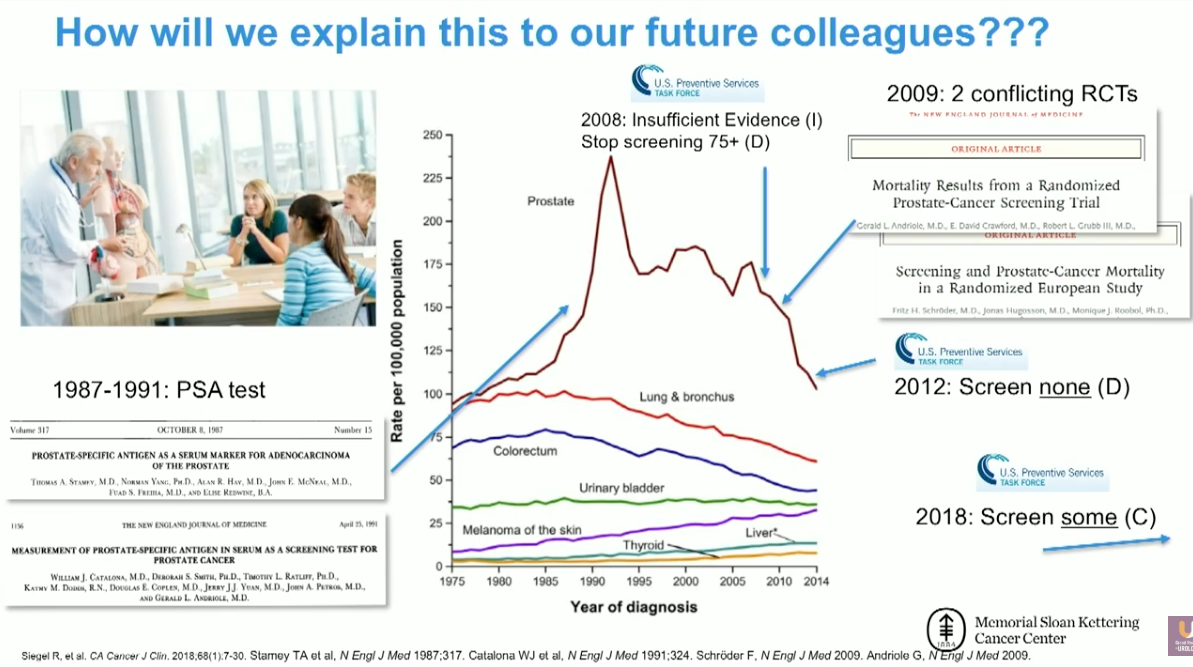Sigrid V. Carlsson, MD, PhD, MPH, presented “How to Optimize the Use of Prostate-specific Antigen in the Current Era” during the 29th Annual International Prostate Cancer Update on January 26, 2019 in Beaver Creek, Colorado.
How to cite: Carlsson, Sigrid V. “How to Optimize the Use of Prostate-specific Antigen in the Current Era” January 26, 2019. Accessed Jul 2025. https://grandroundsinurology.com/prostate-cancer-active-surveillance-in-2019
How to Optimize the Use of Prostate-specific Antigen in the Current Era
Sigrid V. Carlsson, MD, PhD, MPH, suggests that, rather than abandoning PSA screening altogether, doctors should focus on patient selection for screening. She provides 5 key considerations for PSA screening, emphasizing risk-stratification and shared decision-making.
Abstract:
After the development of prostate-specific antigen (PSA) screening, prostate cancer (PCa) diagnosis rates rose. However, due to its inefficiency and concerns about overdiagnosis, the United States Preventive Services Task Force (USPSTF) recommended that doctors stop conducting PSA screening in 2012. As a result, diagnosis levels have fallen to pre-PSA levels.
Even though the age-adjusted death rate from PCa in the US has dropped by 51% from peak rates, the trend toward lower mortality has recently begun to rise once more.
Common misuses of PSA screening in the current era fall into 5 cohesive categories. First, a quarter of primary care physicians order the PSA test without patient input. There is also excessive screening of elderly men with multiple comorbidities who are unlikely to benefit. Physicians have had too liberal of criteria for prostate biopsy, a procedure which brings the risk of infection. Physicians also often treat low-risk cancer too aggressively. Low-volume providers generally administer treatment, which is a serious problem since success rates for procedures like radical prostatectomy depend on the experience of the surgeon.
In order to address these 5 problems, Memorial Sloan-Kettering Cancer Center has developed a set of considerations on the use of risk stratification to select patients for PSA screening and correctly respond to screening results. These guidelines emphasize patient consent, individually risk-stratifying screening, as well as adapting rescreening intervals to the patient’s specific needs. Physicians should also limit screening in men over 70, and in men over 60 with a PSA less than 1 ng/mL. Following screening, physicians should not biopsy without a compelling reason, and should recommend active surveillance for men with low-risk prostate cancer. Finally, if treatment is necessary, physicians should refer patients to a high-volume provider.
About the International Prostate Cancer Update
The International Prostate Cancer Update (IPCU) is an annual, multi-day CME conference focused on prostate cancer treatment updates. The conference’s faculty consists of international experts, and the event caters to urologists, medical oncologists, radiation oncologists, and other healthcare professionals. Topics encompass prostate cancer management, from diagnosis to treating advanced and metastatic disease. Dr. Carlsson presented this lecture during the 29th IPCU in 2019. Please visit this page in order to learn more about future IPCU meetings.
ABOUT THE AUTHOR
Sigrid V. Carlsson, MD, PhD, MPH, is Director of Clinical Research at Memorial Sloan Kettering Cancer Center’s (MSKCC) Josie Robertson Surgery Center and Assistant Attending Epidemiologist, with dual appointments in MSKCC’s Departments of Surgery (Urology Service) and Epidemiology and Biostatistics. Her line of research focuses on screening and early detection of prostate cancer, including multiplex testing and risk-stratified strategies that incorporate clinical information, biomarkers and magnetic resonance imaging, as recently funded by an NIH/NCI U01 award (PI: Carlsson).
Dr. Carlsson also serves as Associate Professor of Experimental Urology affiliated with the Institute of Clinical Sciences, Sahlgrenska Academy, Gothenburg University, in Sweden, where she is an investigator of two large randomized controlled trials of prostate cancer screening (GOTEBORG-1&2), as recently published in the New England Journal of Medicine (Hugosson J, et al. N Engl J Med 2022). In addition, Dr. Carlsson is Adjunct Senior Lecturer in the Department of Translational Medicine in the Division of Urological Cancers in the Medical Faculty at Lund University, Lund, Sweden.
Dr. Carlsson recently completed a K22 career development award from the NIH/NCI to improve shared decision-making for breast and prostate cancer screening. She serves on the National Comprehensive Cancer Network (NCCN) and is a panel member for the American Urological Association (AUA) guidelines for early detection of prostate cancer. Before pursuing postdoctoral studies in urologic oncology at MSKCC, Dr. Carlsson was a physician in Sweden. She earned her MD and PhD from Gothenburg University in Sweden and earned an MPH from Harvard TH Chan School of Public Health in Boston, Massachusetts.

